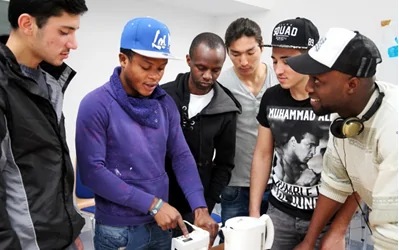Build Bridges for Climate Protection
The project has been completed. It has prepared a feasibility study on energy and water consumption as well as waste production in shelters for refugees in Germany and Italy. Attention was also paid to reducing resource consumption and CO2 emissions.
Circular Economy Education Sustainable Economy Waste

Project info
Germany, Italy
11/17 - 03/18
-
57,584.94 €
Contact info
Birgit Baindl
- Associazione Alvise Cornaro
- Berufsschule Fürstenfeldbruck
- Berufsschule Mindelheim
- Die Energiebildner – Netzwerk für Bildung und Kommunikation e.V.
- E35 Foundation for International projects
- Unione dei Comuni del Trasimeno – Association of communities round lake Trasimeno
Background
In 2015, asylum-related immigration in Europe reached a peak, posing a challenge in terms of integration for many host countries. There was consensus to provide migrants with information on how to become citizens in host countries, including how to use energy and water more consciously and avoid waste. This knowledge transfer should take place through intercultural, participatory dialogue and at eye level.
Project
The project developed concepts and methods for refugees and migrants to make them fit in the topics of resource efficiency, circular economy and climate action (energy, water, waste) during vocational training. They should be able to use their skills in both countries of origin and destination.
Based on the feasibility study on energy and water consumption as well as waste production in shelters for refugees, a pilot for a Training Lab with a focus on intercultural dialogue, resource efficiency and climate action was conducted. The Training Lab was replicated in Italy in a second step. The project encouraged participants to proactively develop a pool of ideas and identify appropriate implementation possibilities (e.g. services, value chains, cooperations). In addition, a network of supportive organisations was identified to support active civic engagement in Germany and Italy. This has strengthened the Community’s resilience to the impacts of climate change and built bridges with NGOs in the countries of origin.

Results
- The amount of residual waste in three large refugee shelters in the Fürstenfeldbruck district was reduced by 5% within four months by installing paper containers with appropriate waste separation.
- The measures have increased awareness of environmental protection and resource conservation among the participants by 50%.
Last update: July 2024
